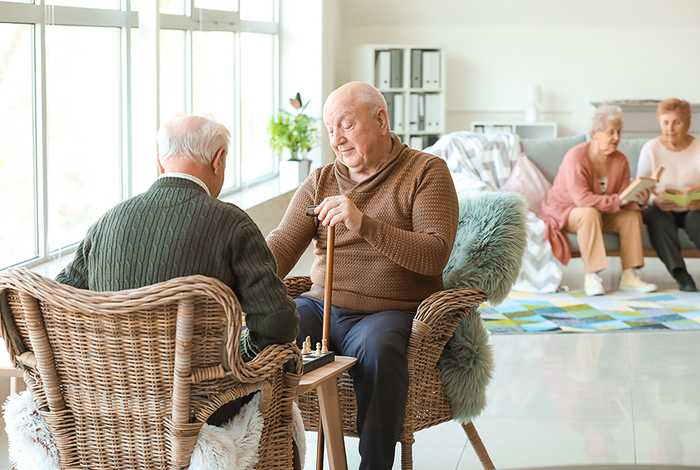Posted by Hannah Rowe
The Care Quality Commission (CQC) - Demystifying Care Terminology
If you are coming into contact with the social care sector for the first time, the terminology can be confusing. Sometimes it seems as though everyone is speaking a different language! In the first of a new series, we will help you to understand the key terms which you may hear, and what they mean. The first one is the Care Quality Commission (which you will probably hear referred to as CQC).
In this Care Quality Commission article we answer:
- What is the Care Quality Commission and what do they do?
- What do the CQC Inspectors look for when they visit a care home?
- How might I come into contact with CQC?
- How can I contact the CQC?
- Does the CQC inspect care homes and other facilities across the UK?
- Where should I begin my search for CQC rated care?
What is the Care Quality Commission and what do they do?
The Care Quality Commission (CQC) makes sure that providers of health and social care are offering services which are safe, effective, and high-quality. The CQC inspects many different types of service, from care homes and home care to dentists, hospitals, GP surgeries, community services, and mental health support.
Their team of CQC inspectors monitor, inspect, and regulate these services and publish their findings in inspection reports. If they feel that a provider is offering care which is not of the required standard, they can also take action to make sure that this service improves.
For care homes, a positive Care Quality Commission inspection is vital if they are to continue providing care for their residents. Normally an inspection happens at least once every three years, and all new care homes must be inspected within 6–12 months of opening. If an inspection concludes that the care home is providing an inadequate service another CQC inspection will happen within six months, but if it is rated good or outstanding, the next inspection can be as long as five years away.
You will be able to find the latest inspection report for the care home(s) you are interested in (or are living in) on the CQC website by searching for the facility’s name. By law, care providers must also display the rating from their latest inspection report on their website and within the home.
- Top tip! When searching for care on Autumna, you will also be able to find the CQC rating on every care provider profile and filter your search by CQC rating.
What do the CQC Inspectors look for when they visit a care home?
When CQC visits a care home, its inspectors ask some key questions to determine how the home makes a difference to the residents’ wellbeing and the quality of the actions which contribute to this. These are:
- whether the home is safe,
- whether it is effective,
- whether it is caring,
- whether it is responsive to people’s needs,
- and whether it is well-led.
These questions are then broken down into more questions for an in-depth look at the service. These questions are called the ‘Key Lines of Enquiry’, or KLOEs.
When you read an inspection report for a care home, you will see these five questions and a grading next to them (outstanding, good, requires improvement or inadequate). This gives you a simple guide to what the CQC thought of the home, and the full report which follows will provide more detail as to how the inspectors reached their conclusions.
The CQC has announced that it will be making changes to its assessment structure during 2023 which, whilst the key questions and gradings will remain the same, will introduce new ‘quality statements’.
How might I come into contact with CQC?
Many family members of residents will not come into contact with the CQC at all, in fact their only interaction with them may be when they read the home’s inspection report.
There are several ways in which you may have further contact with the CQC, such as if they are carrying out an inspection at the home in which you/your family member are resident, and ask for your opinion. You may also wish to contact CQC directly to provide feedback on a service (either positive or negative).
You do not need to be a resident or family member to raise a concern or make a complaint about a care service, or regarding the CQC itself.
How can I contact the CQC?
If you wish to contact the CQC, you can find their contact details on the CQC Contact Us page.
Does the CQC inspect care homes and other facilities across the UK?
The CQC only inspects care facilities in England. Each of the devolved nations has its own inspection body, which carries out a similar function to the CQC. These are as follows:
- In Scotland, inspections are carried out by the Care Inspectorate.
- In Wales, inspections are carried out by the Care Inspectorate Wales.
- In Northern Ireland, inspections are carried out by the Regulation and Quality Improvement Authority.
The Care Quality Commission and its colleagues in devolved nations perform a vital role in keeping people who receive health and social care services safe. Although you may never come into contact with a member of staff from these organisations, their work behind the scenes maintains and improves the services provided to vulnerable people.
Where should I begin my search for CQC rated care?
The Autumna directory of elder care providers allows you to search for care homes across the UK and view their CQC ratings.

You can also filter your search for care on Autumna based solely on the CQC rating. So, for example, if you were only interested in care homes rated Outstanding by the CQC in Surrey, then your search would look like this...

If you still need help with your search for elder care, then this simple questionnaire might give you a way forward. It'll help you crystallise exactly what sort of care you need and what is available in the area you're looking.
Alternatively, for additional support email us here: info@autumna.co.uk or call our Advice Line on 01892 335 330. The line is open seven days a week (8:30am - 5:30pm Mon-Fri, 10am - 5pm Sat, 10am - 4pm Sun).
Receive a Free Care Provider Shortlist!
Let our expert team of advisers get your search off to a great start.
Tell us a little about your needs and we'll send you a bespoke shortlist of care providers! Click the button below to begin, it takes just a few minutes.
Other articles to read
Autumna Blog

Older Persons Care Advice
Annuities for care home fees: Everything you need to know
October 23rd, 2025
Learn how annuities for care home fees provide guaranteed income, financial stability, and peace of mind when planning for long-term care costs.

Older Persons Care Advice
Care options for the elderly: What is right for you?
October 17th, 2025
Discover care options for the elderly that fit your needs, from home support to residential care, helping you plan confidently for the years ahead.

Older Persons Care Advice
Are next of kin responsible for care home fees
October 17th, 2025
Find out the truth about care costs. Are next of kin responsible for paying care home fees? Learn who pays, exceptions, and how to plan ahead.






